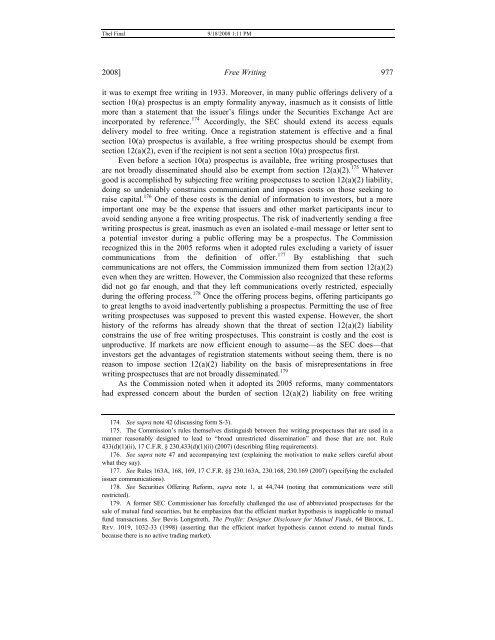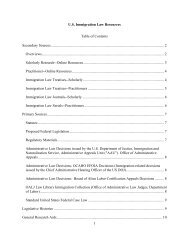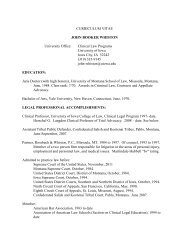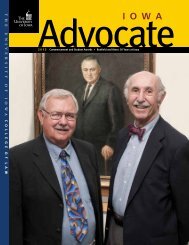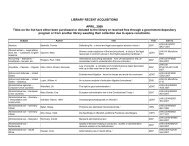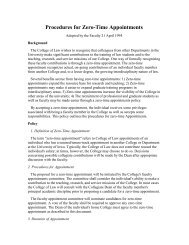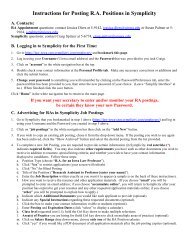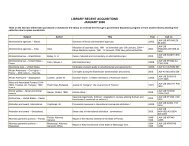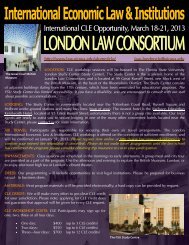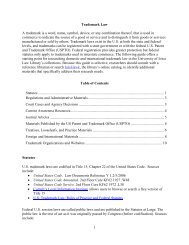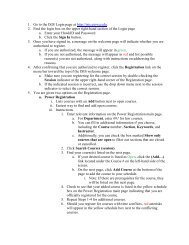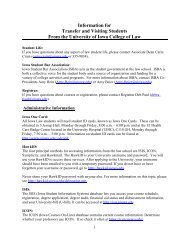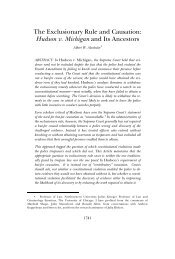Thel Final9/18/2008 1:11 PM976 The Journal of Corporation Law [Vol. 33:4The justification for excepting free writing from section 12(a)(2) does not applyperfectly to free writing prospectuses. The genius of excepting free writing from section12(a)(2) was that doing so encouraged issuers and underwriters to distribute section 10(a)prospectuses. This consideration does not indicate that free writing prospectuses shouldbe excepted now. Given technological, regulatory, and market changes since 1933,statutory prospectuses are readily available and there is no longer any need to pushoffering participants to distribute them. Indeed, the SEC is now much less concerned withgetting statutory prospectuses distributed than it used to be. Thus one of the signal 2005reforms was the implementation of an access equals delivery model, which provides thatin a variety of circumstances a statutory prospectus is deemed to have been delivered forpurposes of the Securities Act if it is on file with the Commission. 171While improvements in communication have undermined the incentive side of thejustification for exempting free writing from section 12(a)(2), they have strengthened theother side of the justification for exempting free writing, and free writing prospectuses aswell. Precisely because information is so widely available and registration statements soeasily accessible, investors do not need the protection of section 12(a)(2) for isolatedcommunications or communications broadly disseminated after a complete section 10(a)prospectus has been filed. In 1933 it was safe to except free writing from section 12(a)(2)because of the availability of alternative sources of information (the delivered section10(a) prospectus) and alternative remedies for misleading free writing. 172 Now section10(a) prospectuses are readily available even if they are not delivered, in recognition ofwhich the SEC no longer bothers to require them to be delivered even when it can.Moreover, the remedies of 1933 are now supplemented by the private action under Rule10b-5. 173Once a complete and final section 10(a) prospectus is available, it is at least assafe—and appropriate—to exempt free writing prospectuses from section 12(a)(2) now asidentifying statements are not prospectuses and are therefore exempt from section 12(a)(2)). The Commissionhas also exempted communications directly. Regulation A permits certain issuers to offer their securitiespublicly without registration. 17 C.F.R. § 230.251 (2007). It also permits them to test the waters prior topreparing an offering statement by, among other things, distributing written documents to determine whetherinvestors are interested in their securities. Such written documents are deemed not to be prospectuses, Rule254(e), 17 C.F.R. § 230.254(e), and accordingly are not subject to section 12(a)(2). See Additional SmallBusiness Initiatives, Securities Act Release No. 6950, Exchange Act Release No. 30,969, 51 SEC Docket 2273(July 30, 1992) (explaining the “test the water” provision); see also Securities Offering Reform, supra note 1, at44,741 n.169 (explaining the relationship between section 2(a)(10) and section 12(a)(2) liability); Solicitationsof Interest Prior to an Initial Public Offering, Securities Act Release No. 7188, 60 Fed. Reg. 35,648, 35,651(July 10, 1995) (same). In 1995, the SEC proposed to permit testing the waters in registered offerings, andproposed that such testing communications would be deemed not to be prospectuses and thus not subject tosection 12(a)(2). Solicitations of Interest Prior to an Initial Public Offering, supra, at 35,651-52.171. See Rules 153, 172, 173, 174, 17 C.F.R. §§ 230.153, 230.172, 230.173, 230.174 (2007) (noting thevariety of circumstances); Securities Offering Reform, supra note 1, at 44,782-86.172. See discussion supra Part III.B (discussing Congress‟s wise decision to exempt free writing fromsection 12(a)(2)).173. The string of decisions restricting liability under section 12(a)(2), culminating in the Supreme Court‟sdecision in Gustafson, probably reflect nothing more than judicial insistence that the judicially createdlimitations on Rule 10b-5 actions should apply to all private securities law claims. See <strong>Steve</strong> Thel, Section 12(2)of the Securities Act: Does Old Legislation Matter?, 63 FORDHAM L. REV. 1183 (1995) (stating that the Courthas generally limited the relief available to private plaintiffs for Rule 10b-5 violations).
Thel Final9/18/2008 1:11 PM2008] <strong>Free</strong> <strong>Writing</strong> 977it was to exempt free writing in 1933. Moreover, in many public offerings delivery of asection 10(a) prospectus is an empty formality anyway, inasmuch as it consists of littlemore than a statement that the issuer‟s filings under the Securities Exchange Act areincorporated by reference. 174 Accordingly, the SEC should extend its access equalsdelivery model to free writing. Once a registration statement is effective and a finalsection 10(a) prospectus is available, a free writing prospectus should be exempt fromsection 12(a)(2), even if the recipient is not sent a section 10(a) prospectus first.Even before a section 10(a) prospectus is available, free writing prospectuses thatare not broadly disseminated should also be exempt from section 12(a)(2). 175 Whatevergood is accomplished by subjecting free writing prospectuses to section 12(a)(2) liability,doing so undeniably constrains communication and imposes costs on those seeking toraise capital. 176 One of these costs is the denial of information to investors, but a moreimportant one may be the expense that issuers and other market participants incur toavoid sending anyone a free writing prospectus. The risk of inadvertently sending a freewriting prospectus is great, inasmuch as even an isolated e-mail message or letter sent toa potential investor during a public offering may be a prospectus. The Commissionrecognized this in the 2005 reforms when it adopted rules excluding a variety of issuercommunications from the definition of offer. 177 By establishing that suchcommunications are not offers, the Commission immunized them from section 12(a)(2)even when they are written. However, the Commission also recognized that these reformsdid not go far enough, and that they left communications overly restricted, especiallyduring the offering process. 178 Once the offering process begins, offering participants goto great lengths to avoid inadvertently publishing a prospectus. Permitting the use of freewriting prospectuses was supposed to prevent this wasted expense. However, the shorthistory of the reforms has already shown that the threat of section 12(a)(2) liabilityconstrains the use of free writing prospectuses. This constraint is costly and the cost isunproductive. If markets are now efficient enough to assume—as the SEC does—thatinvestors get the advantages of registration statements without seeing them, there is noreason to impose section 12(a)(2) liability on the basis of misrepresentations in freewriting prospectuses that are not broadly disseminated. 179As the Commission noted when it adopted its 2005 reforms, many commentatorshad expressed concern about the burden of section 12(a)(2) liability on free writing174. See supra note 42 (discussing form S-3).175. The Commission‟s rules themselves distinguish between free writing prospectuses that are used in amanner reasonably designed to lead to “broad unrestricted dissemination” and those that are not. Rule433(d)(1)(ii), 17 C.F.R. § 230.433(d)(1)(ii) (2007) (describing filing requirements).176. See supra note 47 and accompanying text (explaining the motivation to make sellers careful aboutwhat they say).177. See Rules 163A, 168, 169, 17 C.F.R. §§ 230.163A, 230.168, 230.169 (2007) (specifying the excludedissuer communications).178. See Securities Offering Reform, supra note 1, at 44,744 (noting that communications were stillrestricted).179. A former SEC Commissioner has forcefully challenged the use of abbreviated prospectuses for thesale of mutual fund securities, but he emphasizes that the efficient market hypothesis is inapplicable to mutualfund transactions. See Bevis Longstreth, The Profile: Designer Disclosure for Mutual Funds, 64 BROOK. L.REV. 1019, 1032-33 (1998) (asserting that the efficient market hypothesis cannot extend to mutual fundsbecause there is no active trading market).


